BIG DAMN SPN S2 Score Post [DOWNLOADS]
The big mysterious Season Six question mark has been pretty nail-biting this summer, so in the last couple days wait before the premiere, how about a little blast from the past! Season Two score! Which I've only been promising for YEARS now. *facepalm* I know, I know, this one took forever, and no, it was not because I have some bizarre dislike of this season. I love it! Actually, I had started this, wayyy back when S3 was still airing, and my external hard drive I was storing the cues on died tragically halfway through. So, because I’m the worst at redoing something, it took awhile. I’ve had multiple requests for this season’s score since I first started these posts, but it wasn’t until going through S5 and seeing stark S2 callbacks that I gained the necessary drive to comb through the eps like the season warranted. Season Two was a real classic time of the series, laying down important mythology groundwork with some of the most iconic moments of the show. And the score played a large part of creating these defining moments. So, in the waking hours before S6 premieres, throw away all your anxieties, and take a trip down memory lane. Back before God, the devil, an apocalypse, heaven, or angels came on the scene, where the biggest problems in the Winchesters' world were a few psychic kids and a soul-exchanging father! Ah, such simpler times!
SUPERNATURAL SEASON TWO SCORE POST
All scoring of Supernatural composed by Christopher Lennertz and Jay Gruska

First order of business! In case you have yet to hear, the heavens have shined down on us SPN fans and miraculously, against all odds given us an OFFICIAL SUPERNATURAL ORIGINAL SCORE SOUNDTRACK. I can tell you, when I started these posts four years ago, the most I thought we could hope for was some website-released cues (and that was only if fandom ever organized and begged the composers long enough!) Instead we got a 70 minute, 18 track soundtrack with at least 60+ CLEAN cues! This is nothing sort of a miraculous gift, so if you're reading this and have enjoyed these score posts in the past (and if my download tickers are right, there are a few thousand of you), GO! Buy the CD! Write a review! (There's only six so far!) Show them all how much you love this thing! Shower them with appreciation! I don’t want you to bother reading the rest of this post until you’ve finished that! Important stuff first!
Now, I'm sure having a soundtrack makes most people go, 'WHY DO WE NEED THIS THEN?' If you’ve listened to the official soundtrack already, you’ll notice a number of pieces from this season were included. But the soundtrack could only be so long, and many memorable or interesting cues from this season were still absent. Plus, it's sometimes helpful to hear the score straight from the context of the season! I will have a separate post in the next week or two dedicated entirely to the soundtrack, identifying all the cues contained in each of the 18 tracks (there are many!) and matching them with those already ripped. I've IDed about 90% so far, much of which would have been completely impossible without these season posts. So, see, a purpose! I'll probably go back into these old season score posts and indicate the official soundtrack names of the cues as well. In the name of science and all!
Now, of course, since I've commentated on the other subsequent seasons, I can't help but say a couple words about the score of Season Two in my normal amateur music-writing drivel, so bare with me. I have tried to accurately describe where I could, but I can claim no real musical expertise, so feel free to point out any mistakes! For those of you who are just here for the downloads, feel free to skip below...
ANALYSIS AND CRITICISM
It’s actually a strange experience, looking so closely at an earlier season’s score after you've already dissected the pieces out of seasons that creatively followed it. In a way, it's unfair, because in terms of progressing and expanding the score of Season One, this season's score did so successfully in leaps and bounds, expanding timbre, melody, cohesiveness, and influence of the text to new levels. You might not have noticed the score in Season One, but in Season Two, the score demanded to be heard, and it did so memorably. On the other hand, this expansion also bought with it small stumbles which conceivably led to the larger missteps heard in the score of Season Three. Both composers revealed tendencies to stray towards messiness. Lennertz tended towards boredom during filler eps and could be found recycling old score meaninglessly (like using the iconic 'And So It Begins' during the banal opening of 2.06). Gruska meanwhile increased his musical presence, sometimes more than necessary and at times delved into outright soap operatic campiness (which bizarrely tended to show up in episodes with some of his best work, as I recall the run-of-the-mill ER-like music in 2.01 or the fight music of 2.09.) Furthermore, while more broad and experimental than Season One, it is understandable that the score had yet to grow to the caliber of meaningful score reached in Season Four, as the narrative had yet to undergo such growth either. Perhaps the fairest thing to say is that, at the sake of consistency, Season Two score took riskier chances, but benefited from the successes far more than it was hurt by its stumbles. As such, I saw no need to include these stumbles in the zips below, and have instead chosen to focus solely on the successes.
After Season One, I had briefly discussed the different styles of Gruska and Lennertz. One of the most fascinating aspects of this season was listening to the score evolve into a much more integrated sound. Gruska could be heard using electric guitar melodies similar to those used by Lennertz in the Silly Brothers Theme ("Down The Highway" [2.11], "Damaged Impala" [2.15]). Lennertz could now be heard turning to an acoustic guitar to codify the Roadhouse ('Welcome To The Roadhouse, "The Roadhouse Suite" [2.02], "Got Jo's Dad Killed" [2.06], "Dean Wanted To Stay [2.20]) which helped lend more of that Midwestern sound to the show. Additionally, Lennertz's scoring evolved immensely over this season, especially in terms of timbre expansion, with a more liberal use of woodwinds ("Mom's Alive [2.20], "Still Brothers" [2.20], "Nothing Sam Wouldn't Do [2.22]) and an increased willingness to use multi-layered orchestration for emotional extrapolation ("Sam's Got Jo" [2.14], "Molly's Unfinished Business", "Sunrise/Kinda The Whole Point" [2.16], 'Winchester Family Victory' [2.22]). Meanwhile, Gruska seemed to have not only experimented with different sounds this season, but also could be heard establishing an increased musical presence, especially in the case of scene transition cues like those heard in Croatoan ("Crater Lake", "Wild Town" [2.09]) and Playthings ("Final Guests/Antiquers", "Not Allowed To Leave" [2.11]). Still, we saw patented Lennertz responsible for much of the exhilarating tension and suspense of the season, such as that seen in big movie-like score of 'Nightshifter' (Bank Heist [2.12]) and emotionally unsettling 'Born Under A Bad Sign' ("Disappearance [2.14], "Vengeful Meg" [2.14]). We could also hear classic Gruska underlying the emotionally-driven scenes of 'Heart' ("To Save The Girl", "Morning After [2.17]) and 'Croatoan' ("Monster in Me", "Riverside" [2.09]).
Season Two is easily marked by the world-building the show undertook after its particularly insular Season One, and this expanded world was adequately reflected in the season’s score. Previously much of the show’s score, especially its most distinct, memorable, or emotionally effecting, was conceived directly for the Winchesters. Now, distinct melodic cues could be heard accompanying not just Winchester woes but other secondary characters thoughts and feelings, and as such acknowledged the importance of these new characters. 'Everyone Loves A Clown' opened with the rustic introduction to The Roadhouse gang of Jo, Ellen, and Ash ("Welcome to the Roadhouse", "The Roadhouse Suite" [2.02]), which in being similar to rustic melodies of the past seamlessly tied these characters to the fabric of the show's foundation. Later, in the episode, the score expands on Ellen’s shock and apologetic sympathies to the brothers over John's death ("Ellen's Sympathies" [2.02]). "Jo’s Knife" [2.06] communicated the sentimentality of the object to Jo without a single word while "How It's Gonna Be" [2.14] showed empathy towards Jo in the wake of Dean‘s rejection. The off-kilter violins pass judgment on Gordon’s instability way before we see it ourselves ("Gameface" [2.03]). Andy’s van gets a cheesy 70’s guitar riff to tell of his playfulness way before we learn of his harmlessness ("Magnificent" [2.05]). And a badass 70’s funk guitar melody can be heard during Henriksen’s first entrance ("Agent Victor Henriksen" [2.12]) though it's a shame it couldn‘t have been more prominent.
This season also featured more attention to cohesive, episodic-themed score and the first episode of the season, ‘In My Time of Dying’, set the stage being driven by the Dean Family Dedication Theme ("To Give It All", "Dead Did That", "Same Thing You Hunt", "The Sacrifice" [2.01]). The previously referred to rustic, acoustic melody codifying the Roadhouse ("Welcome to the Roadhouse", "The Roadhouse Suite") defined 'Everyone Loves A Clown‘. A rich, english horn & oboe-driven melody perfectly accompanied the old, haunted, New England hotel of ’Playthings‘ ("Into The Dollhouse, Final Guests, Combing The Hallways, Home Forever [2.11]). ’Houses of the Holy‘ featured a hymn-like major key melody ("Daily Prayer", "Last Rites", "Not An Angel" [2.13]), a rarity in the series primarily relying on minor keys for tragedy and horror, and is most likely where the major key score for 'The Rapture' in Season Four first originated. The opening, sustained notes of ’Born Under A Bad Sign‘ ("Disappearance" [2.14]) quickly tells us of the unsettling nature of the situation and rightly remain present for much of the rest of the episode. In a more playful way, the spooky, Native American flute melody (’The Trickster Theme‘) could be heard repeatedly throughout ’Tall Tales‘ before the episode even revealed the work was that of a Trickster. And finally, "Roadkill"'s complex, effusive score made the episode resonate far beyond Molly’s situation, extending it straight to the Winchesters themselves ("Seeing David Again", "Molly's Unfinished Business", "Sunrise/Kinda The Whole Point" [2.16]). In fact, quite aptly, the melodies heard here were then expanded on later on in the season during the big Winchester family moments of 'What Is ("Still Brothers" [2.20]) and 'All Hell Breaks Loose, Part II' ("Winchester Family Victory", "Their Whole Lives" [2.22]).
Over the course of the seasons, perhaps the most memorable score of the series has become the aforementioned Dean Family Dedication Theme (affectionately nicknamed by most fans as the 'Dean Theme') and its motif usage was first solidified in this season. This theme could be heard in emotional scenes throughout the season, possessing a strong sense of meaning and purpose, adding dimension to the scenes it accompanied, and overall pulling the season together from bookend to bookend. After first appearing in the Gruska-scored 'Devil's Trap' [1.22] accompanying Dean's spoken fears concerning the things he is willing to do for his family, its melody becomes the major musical theme of the season two premiere, 'In My Time of Dying' [2.01]. In here, it is most notably paired with John and his silent decision to sacrifice himself to save Dean ("To Give It All" [2.01]) and silently suggests his sacrifice was for Dean in response to everything Dean had given him and Sam over the years. Furthermore, the choice to bookend The Secret with the motif told us of John's belief in Dean and his power to watch over his family ("Dean Did That", "The Sacrifice" [2.01]). As it is carried throughout the season, the theme referenced not only Dean's responsibility to keep Sam safe, but also the burden of The Secret, and marked Dean's weariness with this life, both in 'Croatoan' ("Tired" [2.09]) and 'Playthings' ("Promise Me" [2.11]). During Dean's Wish World in 'What Is', Lennertz quite brilliantly (whether intentional or not) referenced this theme in a flatten form of the theme's melody right as Dean realizes that the Sam in this world does not need him, and thus signified the loss of that responsibility ("Lost Purpose" [2.20]). Probably most memorable is its use at the end of 'All Hell Breaks Loose (Part 1)', as Dean held a stabbed Sam and watched him die in his arms ("The Fatal Wound" [2.21]). This use all at once invoked the whole season and all of Dean's dedication towards his family right before your eyes, helping the viewer to mourn with Dean his complete loss of the most important people in his life and subsequent loss of purpose. I first made these ripped cues available at the end of Season Three, but have extended the clips for context in this season's zips. You can hear and download all instances of this motif in the first four seasons HERE. The nine instances heard in Season Two alone can be heard below:
The guitar grit score (as aptly named by the new soundtrack) came into increased prominence during this season. In addition to more Silly Brothers Theme ("Cement Truck" [2.06]), guitar licks could be heard from cheesy ("Magnificent" [2.05], reused for the Trickster's own brand of cheese in 2.15) to rockin' ("Down The Highway [2.11], "Damaged Impala" [2.15]) to gritty ("To The Crossroads" [2.22] a CLEAN VERSION, courtesy of Lennertz's myspace) to rustic ("Welcome to the Roadhouse", "The Roadhouse Suite") to bluesy roots ("Prison Blues", "A Staged Fight" [2.19]) complementing the addition of the Robert Johnson legend to the show's mythology. I also shamelessly cut the "Blues Number" from the opening of 'Crossroad Blues' because the quality of chords in that bit sound like heaven to my ears (and seriously, has anyone IDed which Johnson song this is? Is it supposed to be a modified arrangement of 'Traveling Riverside Blues'? I can't seem to place it exactly).
There was also another reoccurring Gruska melody heard throughout this season first pointed out to me by a fellow LJer during the first season score post. Since then I've gotten repeated requests for it, and for good reason, as the more I listen to it the more its become one of my favorites of the season. Though similar melodies pervade through all of these different instances, it cannot technically be thought of as a theme or motif, because there is no one distinct repeating melody nor no set instance it is used, though there are tenuously similar thematic threads. It is first heard during the end scene in 'Bloodlust' where Sam reiterates to Dean that no matter how similar his thoughts were to Gordon, it's how he acted in the end that mattered ("What Matters" [2.03]). Croatoan expanded this flourished melody throughout the episode, first heard as the Impala roars into the town where Sam's vision saw Dean shoot a man ("Crater Lake" [2.09]). By the end of the episode, it accompanies probably the most floral melody this show has ever heard, leading into Dean telling Sam what John told him before he died ("Riverside" [2.09]). It mysteriously reapppears in a seemingly lighthearted moment of 'Heart' as Sam watches over Madison early on in the episode ("Destiny Calling" [2.17]), but sounds more ominous retrospectively after Madison becomes solely a reminder of Sam's inescapable destiny. Listen to all these instances together HERE or below:
For a sophomore season, there were quite a number of callbacks to be found in the score, but probably the most brilliant was the constructed callback score surrounding 'Heart' which combined melodies and timbre heard previously in 'Croatoan (the "Crater Lake"/"Riverside" fusion heard in "Destiny Calling" [2.17]) and 'Playthings' (the rich woodwind melodies heard in "Morning After" [2.17]). If we recall, these were two episodes which dealt heavily with the issues of trying to course-correct ones' path and beat destiny back, and as such it seems like the perfect two to reference in order to draw intense emotional underpinnings of the season to the episode. "A Father's Despair" first heard in the Season One episode, 'Dead in the Water', was reworked slightly for John's elegy ("Despair for a Father" [2.02]) as the brothers watch his pyre burn. 'Playthings' episodic score melody was an expanded variation of the episode theme first heard in 'Something Wicked' [1.18]. Parts of "And So It Begins" were heard during Meg's exorcism ("Not a Normal Exorcism" [2.14]) perhaps as a reminder of the first violation towards Sam by her father and aptly heard again in the previously of 'What Is And What Should Never Be' as we're reminded of the original act that took Mary's life. The reappearance of the distorted Dean Theme in 'All Hell Breaks Loose, Part I' as Sam tells Ava about her fiance's death silently communicates Sam's own fear of Dean's death ('The Loss of Another' [2.21], and in referencing the same melody used in 'In My Time of Dying' ("The Same Thing You Hunt" [2.01]), the cue reminds us of Dean's mortality way before a knife or crossroads even appear.
Perhaps the most noteworthy episodic score of the season is Lennertz's heart-wretching cues for ’What is and What Could Never Be‘ to capture Dean's series of emotions while inhabiting his wish verse. It begins with probably my favorite piece of the year, the very David Raksin-like 'Mom's Alive', highly reminiscent of Laura [1944] score (which if you know anything about the film, is a whole other essay in itself) with a rich, strongly alluring yet haunting oboe, a memory-stirring piano melody, a tear-gushing violin, and a faint harp. "At John's Grave" features a real tear-jerker violin melody that could be argued acts as John's voice Dean talks back to throughout the scene (especially since the lone violin has been tied to John since the final moment of the opener in the pilot, featured at the end of 'And So It Begins'). "Still Brothers" begins with the ending of the flattened Dean Theme ("Lost Purpose"), and after Dean's morose apology and goodbye to wishverse!Sam, the hopeful ascending melody predicts Sam's reappearance by the car a moment later. A cyclical, mind-churning piano and violin melody is heard throughout Dean's temptation to stay in his Wish!Verse ("Dean Was Happy"). After his return to the real world, remnants of this melody can be heard as he describes the world to Sam ("Remnants"), and reiterates the scars the experience left. Which is quite relevant for the upcoming Season Six! Lastly, the indecisive guitar and violin melody in "Dean Wanted To Stay" reflects Dean's wavering belief that the life they lead is really 'worth it'. Listen to highlights from this episode below:
There's definitely a specific crop of cues which stood out to me above the rest while putting this post together. Many of these have been briefly mentioned above, a few I've missed fitting in here due to how gigantic this post already is, but their influence is worth more attention than I have the time to give them. Really, you could probably write paragraphs more on each one of these! And I invite anyone who wants to do so! So, because it's an experience listening to all the big score moments of the season at once, (especially for those who don't want to be bothered by the larger zips) I've put together a highlights playlist for a quick taste what the score offered to this season. Listen HERE or below:
[Download HERE]
Some smaller pieces worth recognizing are the distinct timbre choices of the season. For instance, the dying horn melody which accompanies Dean's blood splatter moment in 'Bloodlust' ("Brutal Kill" [2.03]) is an interesting when you consider that the horn has been representative of Dean's voice as early as the pilot "Let's Go Hunting" [1.01]. In fact as Sam dies at the end of the season, a muted horn plays the Dean Theme "The Fatal Wound" [2.21]). In the finale that follows, a rising muted horn melody accompanies Dean's final words to the dead YED "Their Whole Lives" [2.22] and since been a denotation of Dean's heroism (it's been nicknamed 'Dean's Hero Horn' in my head the last two years, hee). "Doing God’s Work" [2.13] was the only discernible cue of the season to include vocals, while the beginning of "God's Will" [2.13] featured mysterious wind chimes. And finally, the aforementioned "Trickster Theme" [2.15] included Native American melodies and instrumentation seen later in Season Four to denote Dean's experiences in Hell.
Talking about the use of silence in a post on score might sound a little strange to some, but in music, a rest is played just like any other note and represents a conscious choice to refrain from sound. And choices about where the score is silent and where the score enters can be interesting to consider, especially in emotionally effecting moments like those in "Reconciliation Road" [2.02] (where the entrance of score punctuates Sam's quiet response to Dean's worked up accusation), "A Mountainside Confession" [2.04] (where the score holds back to Ackles' performance), and "Nothing Sam Wouldn't Do" (where the score's entrance acts as Dean's silent admission to Sam's accusation). One particular interaction with silence which becomes retrospectively neat from S5 perspective, is in "Redemption [2.13] where strings begin right at Father Thomas's pointed pause, before turning to Sam with "Some people need redemption, don't they?".
There are also a whole bunch of smaller bits. For instance, the ominous punctuation on Dean locking Sam out in "Monster in Me [2.09] as well as the sustained sound to note his struggle of indecision as he tries to pull the trigger. Or the accent in "One Day" [2.10] to punctuate the look Gordon gives Dean after his 'you don't know that!' objection to Sam becoming a monster one day. The basis of the more elaborate 'Monster Movie' in Season Four could first be heard in the light, whimsical fun of "The Hollywood Suite" [2.19]. Meanwhile, quite randomly, the origins of the 'Bedtime Stories' repeating thematic was first conceived as a cue inside the Greeley house in 'Roadkill' ("Searching The Greeley House" [2.16]). Other fun bits include "Anthony Giles" [2.07] where the score deceptively sells the lie Sam tells the cops, or the small cessation of score in "Antiquers" [2.11] as the bellman expectantly looks for his tip.
And jeeze, I feel like I'm just grazing the surface, if you look and listen yourself, there's bunches of other interactions going on! I'm sure I've bored most of you enough, if you've reached the end of this, I admire your tenacity because this thing has become a beast. Once it became a certain length, I stopped myself from going into any more, especially because this is just my interpretation of the score. I imagine there a countless other ways to read pieces as well, so I encourage you to just listen, and see for yourself what you hear and what connections you can find!
One more thing! I’ve included some classic soundtrack moments in this, because, well, THEY‘RE AWESOME. And I couldn’t refuse! Plus, they had some really interesting moments, either blurring the lines between soundtrack and score or whimsically play with the definition of diegetic and non-diegetic sources. "Sam’s Confessional" [2.13] and "Oh Mama" [2.12] are two places where the soundtrack effortlessly bleeds out of the score. "Back in Black" [2.03] begins outside the car non-diegetically, only to be revealed as diegetic once the camera swoops inside the car to where Dean is playing the song on the radio. Moments later, when Dean floors the Impala away from the car, the music shifts back to non-diegetic as the source cuts to outside as the car zooms away. "Long Time" [2.21] combines all of these, first as a non-diegetic soundtrack revealed to be diegetic, then to soundtrack bleeding into score, finally to score overlaying diegetic soundtrack! It’s NUTS! Of course, then you have moments like "White Rabbit" or the tampered with "Renegrade" in "Oh Mama" that functions with as much influence to the text as score itself, but with lyrics.
NOTE: Some have asked where my titles for cues in these score posts have been coming from. Please know, I have no contact with the composers of these scores and as such none of these titles are official. Instead, these are simply titles I came up with purely out of organizational need, following an easy score cue nomenclature in which the title reflects the scene in which it was scored for, similar to the scheme Lennertz followed in his unreleased soundtrack four years ago. I have no idea what crack-machine the cues went through to generate those wacky new official soundtrack titles, but no attempt will be made to try to match them. ;)
I've divided the season's cues into two 125 MB zip files that each contain 69 MP3 files. That's 138 MP3s in all with a run time of 171 minutes.
Considering the size, I'd suggest using the rating's system in iTunes in order to rank the cues and keep track of your favorites, since they can get easily lost in the shuffle. I found it incredibly useful in sorting through all of these.
Some other features that should be helpful:
- All music has been volume boosted to go with season’s soundtrack. You can further adjust it to your liking using iTunes. Right click Get Info. Click Options tab. Use Volume Adjustment.
- All music is automatically labeled for iTunes with Artist and Album for easy access.
- All non-dialogues are marked with [#]. When you want to just hear instrumentals, simply enter # into your itunes search.
You’ll notice there’s less [#]s and more cues with a longer runtime. Season two was gifted with much longer cues than other seasons I've cut, and despite the dialogue, I really wanted to get the full range of each piece. Another reason to keep track of your favorites with the iTunes ratings.
The cues are listed below in the order that they appear in each episode. Most cues' origins should be easily discernible by title or dialogue, but if there's any your curious about, feel free to ask! I hope you all enjoy!
(And DON'T FORGET THAT SOUNDTRACK! There's hard copy CD and MP3 download options!)
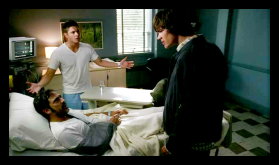
2.01 - ‘In My Time of Dying’ [Gruska]
- RECAP: Stranglehold
- Dean Wakes Up
- Sam's Alright/For Dean
- To Give It All [Dean Theme]
- Doing This For Dean
- Oujii Connection
- Just Startin' To Be Brothers Again
- Deal Making
- Same Thing You Hunt
- Dean Did That
- Final Words
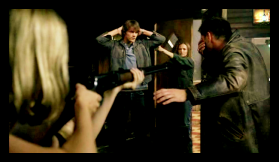
2.02 - ‘Everyone Loves A Clown’ [Lennertz]
- RECAP: Time Has Come Today
- Despair for a Father
- Welcome to the Roadhouse
- Ellen's Sympathies
- Don't Want Regular
- Reconciliation Road
- The Roadhouse Suite
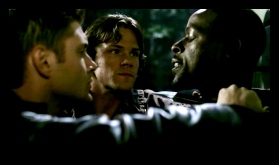
2.03 - ‘Bloodlust’ [Gruska]
- RECAP: Wheel in the Sky
- MUSIC: Back in Black
- Brutal Kill
- Gameface
- Bridge Score [#]
- What Matters
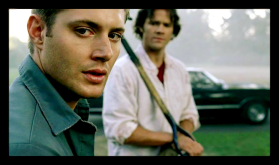
2.04 - 'Children Shouldn't Play With Dead Things’ [Lennertz]
- At Mary's Grave
- Blood On Your Hands
- One Last Look [#]
- A Mountainside Confession
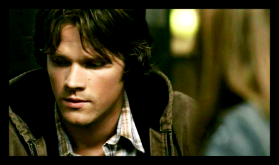
2.05 - ‘Simon Said’ [Gruska]
- Weirdo Visions
- Magnificent
- Be Good
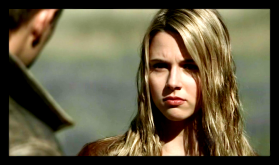
2.06 - 'No Exit' [Lennertz]
- Options
- Jo's Knife/Memories of Dad
- It's Got Jo
- Cement Truck [Silly Brothers Theme]
- Got Jo's Dad Killed
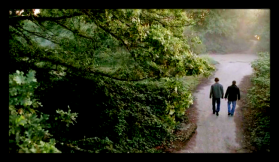
2.07 - 'The Usual Suspects' [Gruska]
- Anthony Giles
- Ending
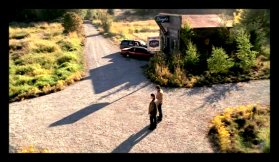
2.08 - 'Crossroad Blues' [Lennertz]
- MUSIC: Blues Number
- What If He Did
- At The Crossroads
- One Life For Another
- Misery's The Whole Point
- Bring Dad Back
- Hell
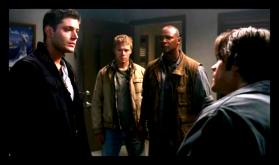
2.09 - 'Croatoan' [Gruska]
- Crater Lake
- Wild Town
- Monster in Me
- Tired [Dean Theme]
- Riverside
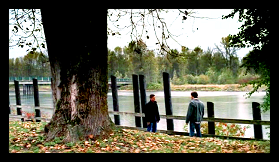
2.10 - 'Hunted' [Lennertz]
- MUSIC: White Rabbit
- Before Dad Died
- Spinning Out of Control
- Scott's Nightmares
- Ava Appears
- Fighting on Hell's Side
- One Day
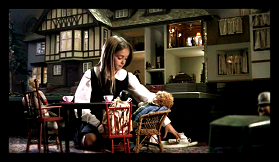
2.11 - 'Playthings' [Gruska]
- Into The Dollhouse
- Down The Highway
- Final Guests/Antiquers
- Combing Hotel Hallways
- Promise Me
- Not Allowed To Leave [#]
- The Pool
- The Rescue
- The Sisters
- Home Forever [#]
FULL ZIP FILE OF EPISODES 201-211
(Secondary DL link HERE)
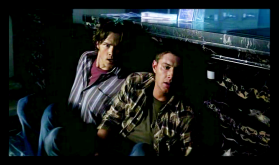
2.12 - 'Nightshifter' [Lennertz]
- Sorry, Ron
- So Screwed
- Agent Victor Henriksen
- Phonecall
- MUSIC: Oh, Mama
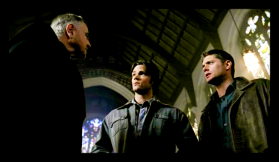
2.13 - 'Houses of the Holy' [Gruska]
- God's Will
- Doing God's Work
- Daily Prayer
- Not An Angel
- Redemption
- Last Rites
- Sam's Confessional
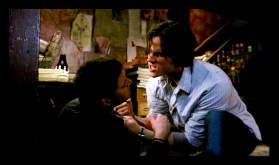
2.14 - 'Born Under A Bad Sign' [Lennertz]
- Disappearance
- Dean Can't
- Sam's Got Jo
- Dean's Fight
- No Ordinary Exorcism
- Vengeful Meg
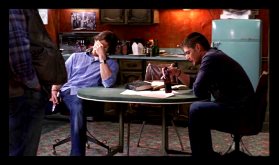
2.15 - 'Tall Tales' [Gruska]
- Damaged Impala
- The Trickster Suite
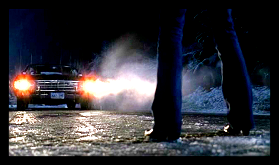
2.16 - 'Roadkill' [Lennertz]
- Searching The Greeley House
- Seeing David Again/Montage
- Molly's Unfinished Business
- Sunrise/Kinda The Whole Point
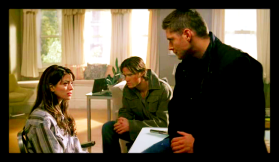
2.17 - 'Heart' [Gruska]
- Destiny Callback
- Confusion
- Bite Origins
- To Save The Girl
- Morning After
- Waiting Out The Night
- No Choice
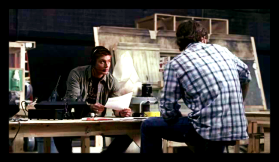
2.18 - 'Hollywood Babylon' [Gruska]
- Hollywood Suite
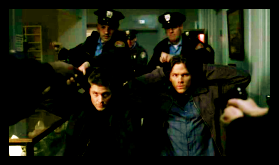
2.19 - 'Folsom Prison Blues' [Lennertz]
- Prison Blues
- The Boys Get Caught
- A Staged Fight
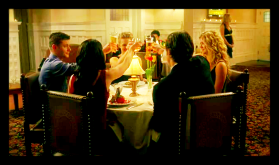
2.20 - 'What Is & What Could Never Be' [Lennertz]
- Previously
- Mom's Alive
- Home At Last
- Lost Purpose
- At John's Grave
- Still Brothers
- Dean Was Happy
- Remnants
- Dean Wanted To Stay
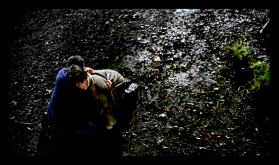
2.21 - 'All Hell Breaks Loose - Part One' [Gruska]
- RECAP: Foreplay
- MUSIC: Long Time
- Frontierland
- Roadhouse In Ruins
- Keeping Calm
- The Loss of Another
- Always Been About Sam
- Only One
- Upper Hand
- The Fatal Wound [Dean Theme]
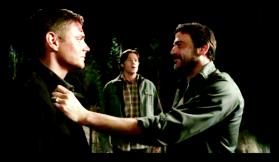
2.22 - 'All Hell Breaks Loose - Part Two' [Lennertz]
- RECAP: Carry On
- Let It End
- One Job
- To The Crossroads [CLEAN]
- One Year
- Back To Life
- Samuel Colt's Devil's Trap
- Cemetary
- Devil's Gate
- John Returns
- Winchester Family Victory [#]
- Their Whole Lives
- Nothing Sam Wouldn't Do
- Don't Look Back
FULL ZIP OF EPISODES 212-222
(Secondary DL Link HERE)
OTHER SPN SCORE POSTS:
- BIG DAMN SPN S4 Score Post [Downloads]
- BIG DAMN SPN S3 Score Post [Downloads]
- Dean's Family Dedication Theme [Downloads]
- Season Two's Scoring Overview Meta
- Big Damn SPN S1 Score Post [IDs and Downloads]
- List of Episodes for Each SPN Composer
- SPN's Musical Motifs
- SPN Composer Interviews
- SPN Pilot: Comparing The Pre-Aired Score to Aired Version's